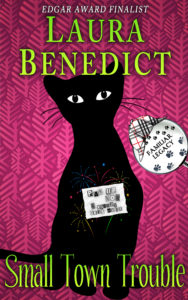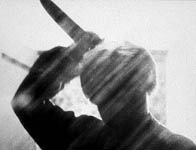Gentle Readers, today another Brave Soul has brought their work to the critique altar.
Chapter 1. A Thing of Beauty
I’m forgetting things.
That’s not good when someone’s been murdered.
Not when I’m holding a gun in my hand.
My memories are all mixed-up. I watch myself… this memory thing… always watching for lapses. The war, my mom’s illness…
Or maybe the lump on the back of my head has something to do with it?
Or maybe I’m seeing ghosts.
Lemme try get things straight.
I remember how it started… She came to my office—or did it begin before then?
Fog and anger and my finger pulling the trigger…
No, I have to get this straight.
Let’s start with the meeting…
* * *
I was in my office—up two flights, turn right and I’m at the far end. It must’ve been late. It was getting dark. A Wednesday. I never understood Wednesdays. Too far away from both weekends. Not that I did much at the weekend. Especially when I couldn’t afford to play poker with the boys.
I was closing up. The usual things: scowling at the in-tray full of bills, checking my phone was still working, closing the inner office door, switching off the lights in the outer office… Someday I’ll be able to afford a receptionist to look after these things for me.
Someday.
In the darkness the harsh splash of neon lights from the street below splattered across the office ceiling like weapon flash. Movie-town was still making magic and bringing dreams to life with flickering lights. Spinning money out of dreams. Little changed while I was busy in Europe saving the world. Was it really five years since that Liberty ship offloaded me back onto American soil, to find my mother crippled and confused by a blood clot in her brain?
I don’t know how long the blonde was standing in the doorway while my mind wandered. Maybe she made a sound, I don’t know, but I snapped out of it and took a look.
She was a sweet shape silhouetted by the strip lighting in the hallway and topped by tumbling platinum hair. I took in the sheath of her pencil skirt and snug, fitted jacket. I wanted to see more.
Maybe she was just asking directions for another of the petty outfits in this rat-run of a decrepit building.
I flipped on the lights in the reception area.
_______________
Kudos to Anonymous Writer for excellent clarity of sentences and scene visualization. The prose is sharp and moves at a good clip. But, oh my, I’m not sure how to approach this piece. Is it meant to be an homage to noir detective films and stories? It feels less like homage than clever duplication.
The image that immediately popped into my head was of Fred MacMurray in the classic noir film Double Indemnity (novel by James M. Cain). It begins with his character making a recording in his office–a confession about his involvement in evil Barbara Stanwyk’s murderous insurance scheme that results in the death of her husband.
But a more direct parallel is to the opening of both the novel and film of Hammett’s The Maltese Falcon. Sam Spade does have a receptionist, and it’s not the end of the day. Still there’s a beautiful woman in distress who shows up at a less-than-profitable private detective’s office, and not too long after, something goes badly wrong. (I can only assume our first-person character is a detective.)
The third comparison is to J. K, Rowlings’s more modern character, Cormorant Strike, also a struggling detective.
The examples could go on and on because this is a classic, even clichéd scene.
First section:
“I’m forgetting things.” Then we’re presented with a litany of things they might have forgotten–or barely remember. I’m visualizing a cloudy collage above their head. Mom’s illness, bombs going off, a gun… It’s a voiceover, a setup. People don’t actually talk to themselves this way. If this is indeed an opening to a novel, it deserves better treatment. Here’s a person who believes they might have committed a murder. That’s a very scary prospect. Where’s the shock? The drama? They’re HOLDING A GUN. They can’t be just standing there about to drift off into a long reverie about how they got where they are. How much better to give us an entire scene.
Second:
The prose here is very good. I particularly like this line: “In the darkness the harsh splash of neon lights from the street below splattered across the office ceiling like weapon flash.” Again, a bit too familiar, but far more substantial as the first lines of a novel than the original.
I still have to ask, what end does the scene serve? It’s dour and sad and a little lusty: classic noir is classic noir. As it is, it doesn’t offer the reader anything new. My only advice can be to either change it to make it more surprising, or possibly drop the intro and start here. I’m frustrated.
So, TKZers. I’m handing this over to you. What do you make of it? Am I missing some vital point?



